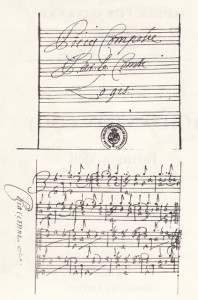Here’s me playing an Aria by Joh. Anton Logy (1650-1721), recorded at the Licata Studios (my bathroom). It’s the first piece most classical guitarists learn.
[sc_embed_player fileurl=”http://alifesworkmovie.com/wp-content/uploads/2012/04/logy_j_a.mp3″]Which is to say it’s very easy to play. Which is not to say that it isn’t beautiful. Of all the tunes I play, this one is often a favorite, even though I play many tunes that require plenty more virtuosity. I’m okay with that.
What do you make of that?
P.S. I think you may be hearing this piece again soon.


Susan Elbe
Lovely. David! The simplicity is, I think, what grabs people.
David Licata
Thanks, Susan. I’m glad you like it.
I think you’re right. I think people respond to the simplicity of this piece in the same way that some folks respond to Shaker furniture. It’s interesting, so much of my work is described as simple and sometimes even “primitive.” I have resisted these descriptors, but maybe it’s time I embrace them.
And thanks for taking the time to leave a comment.
David
Keane
Complexity and beauty are most definitely not always proportional. Many folk songs I think are incredibly beautiful and simple, like “Shenandoah”. Do you know any of the Estonian composer Arvo Part’s music? Case in point: http://www.youtube.com/watch?v=B8qg_0P9L6c
David Licata
Keane!
Very, very true. Some things are be simple and beautiful (thanks for the link–very beautiful music I hadn’t heard before!), other things are complex and beautiful, other things are somewhere in between. I suppose it’s really my own hang up. For example, I think my writing has a concrete quality, not what I’d call lyrical. And yet, I wish could write lyrically, purply, even.
Often we don’t appreciate our strengths, but instead spend an inordinate amount of time and energy trying to improve what we perceive to be our weaknesses.
Thanks for reading and leaving a comment. Good to see you here.
Best,
David